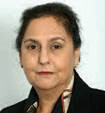
Professor Soraya Dhillon MBE, Dean, School of Life and Medical Science, University of Hertfordshire.
I have always loved Science and especially Chemistry. When at school, I was good at Maths and Science and had a supporting family who steered me towards studying Pharmacy, which I went on to do as my first undergraduate degree. During my third year of study, I had already decided to do a PhD. I loved pharmacology and went on to complete clinical pharmacology at the University of London. I had the full support of my family and this enabled me to work at weekends and commit myself to my studies. My PhD was lab-based with two clinical studies at the Chalfont Centre for Epilepsy. The research examined drug interactions between anticonvulsant drugs and we pioneered the early development work on Stesolid for the management of status epileticus.
Following my PhD, I worked in a variety of roles which helped develop Clinical Pharmacy services. This involved pharmacists working with clinicians to improve prescribing, and working with patients to ensure medicines were safe and effective. I also developed one of the first clinical pharmacokinetic services led by pharmacy at Northwick Park Hospital.
Working in Pharmacy gave me a good balance of Science and Clinical Practice. My early career also helped me maintain a good work-life balance. But I also knew that my heart was set on research. I became an academic in 1993 as a Clinical Pharmacist at the then London School of Pharmacy (now UCL School of Pharmacy). During this time I took on a range of roles, including Acting Head of Department of Practice and Policy. I also became Director of Taught Postgraduate Studies and led the development of the largest postgraduate portfolio of education and training for UK/European pharmacists. In 2004 I was appointed by the University of Hertfordshire to establish and lead a New School of Pharmacy. During this time I developed a suite of postgraduate programmes, established a research infrastructure, lead a successful Research Assessment Exercise submission in 2008, and developed two research centres in 2011. Moving to the past 4 years, I managed the merger of 4 academic schools and now have 4 research centres in the School of Life and Medical Sciences. I have also grown research from annual awards of 2-3 million to 8 million this year.
Looking back, I consider two main opportunities which I have exploited in helping me gain experience, and later establish a career in Leadership and Management: becoming a non-executive director of a Health Authority, and a Chairman of an NHS Foundation Trust; and secondly always ensuring my role and job changed every 5 years to ensure I develop a wider skills set.

During my 10 years in the NHS Trust, we transformed the organisation from being a district general hospital to being the 1st Foundation Trust in Bedfordshire, Hertfordshire and Buckinghamshire in 2006. In 2010 I stepped down, after we had achieved double Excellence in the Care Quality Commission review. My CEO placed patient safety at the heart of our strategy: we understood that we were all there to enhance the effectiveness of our patient care and keep patients safe. At the time, this was something new and pioneered by the CEO and Trust Board.
I juggled a pretty intensive career in terms of academia and non-executive roles, and the reason I managed this was the support of my family. A significant achievement for me is that I have always managed to maintain my research career alongside my leadership duties producing 2-3 publications per year and being part of the Research Excellence Framework (REF) submissions. Over the last 5 years I have also continued to bring in grant monies and provide mentorship for my research staff.
I feel that, as you progress in the world of senior management and leadership, it is important to remain grounded in student experience and also continue as an active researcher. When I took on my latest role of Dean of School, I continued to supervise research students and worked with student representatives to ensure that I had access to frontline intelligence.
During my career in management and leadership, I have become increasingly passionate about promoting an inclusive culture where all individuals can thrive and be supported in their career aspirations. It is imperative that gender equality principles are embedded in HE organisations to support colleagues to achieve the best possible work-life balance: as a manager, you have a clear responsibility to enable that for all your colleagues, and also yourself.
I established and Chair the School’s Athena SWAN team. We achieved the Bronze Award in November 2014 and are continuing to implement actions which support all staff, both academic and professional, in the School and have already identified the impact of our actions. We have just submitted our Silver submission with a view to pursing our Gold application by 2020.
In my career I have always put my family first. I have worked to ensure that I adapt to my children’s life, not vice versa. I have been fortunate that I have always had the support of family, my parents and my husband. In the latest phase of my life and career, my husband and I have now adapted our work patterns to help my daughter, who has become a mother herself and who has an intensive medical career. My whole life changed after we had our granddaughter. At this stage in my career, I have made a conscious decision that it is my daughter’s time to progress in her medical career.
I am ready for retirement, though I hope to continue to be involved in mentoring colleagues and supporting them in their career progression. I also enjoy my non-executive role and envisage maintaining a portfolio career, though certainly not full-time.
My motivation lies in the fact that I enjoy what I do. I wouldn’t describe myself as ambitious: I have simply always wanted to do something that motivated me, and that made a difference. There is life outside work, in whatever form that is, and it is important to enjoy and live that life. Men are now also recognising the role they can play in the family unit and are taking on a more paternal role. My personal view is that your partner and you must recognise the ambition of each of you and work to understand what the joint and personal priorities are. Things are achievable: the busier you are, the more organised you are. It is about being clear and knowing what your life priorities are, enjoying and recognising how precious life is. Always remembering nothing is impossible.





Leave a Reply